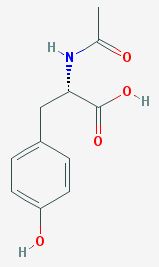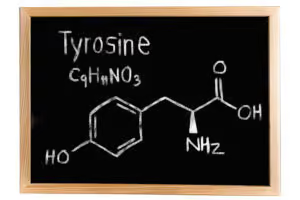Table of Contents
N-Acetyl L-Tyrosine (NALT or NAT) is a highly bio-available form of the amino acid L-Tyrosine. Your brain uses the enzyme tyrosine hydroxylase to convert L-Tyrosine into L-DOPA. Decarboxylation of L-DOPA results in synthesis of the neurotransmitter dopamine.[i]
Once converted into dopamine, the enzyme dopamine-beta-hydroxylase converts it into the neurotransmitters norepinephrine (noradrenaline) and epinephrine (adrenaline). This triad of neurotransmitters are collectively referred to as “catecholamines”.
N-Acetyl L-Tyrosine can be a highly effective nootropic for boosting cognitive function. And is particularly helpful in maintaining cognitive performance when you’re under practically any kind of stress. Including music played above 90 dB’s.
N-Acetyl L-Tyrosine works in synergy with stimulants like methylphenidate (i.e. Ritalin).[ii] Drugs like Ritalin work by blocking the reuptake of the neurotransmitters dopamine, and norepinephrine. And if there’s not enough dopamine available to do the job, Ritalin doesn’t work very well. NALT potentiates increases in extracellular dopamine.
NALT also stimulates the production of thyroid hormones T3 (triiodothyronine) and T4 (thyroxine) which are crucial in maintaining both overall physical and cognitive health.
NALT can boost libido, memory, focus, concentration, mood, offers anti-depressant effects, and improves executive function in those with ADHD.
N-Acetyl L-Tyrosine helps:
- Cognitive Stress. NALT produces the catecholamine-triad of neurotransmitters dopamine, norepinephrine and epinephrine. Sleep deprivation and extreme stressors like heat and cold can deplete catecholamine levels. NALT restores them to preserve optimal cognition.[iii]
- Neurotransmitters. NALT is a necessary precursor for dopamine, norepinephrine and epinephrine. As your dopamine levels increase, you’re better able to concentrate, organize your thoughts, and stay productive.
- Attention Deficit Disorder (ADHD). NALT can be an effective treatment for ADHD symptoms. NALT works in synergy with pharmaceutical drugs like Ritalin and Adderall by boosting extracellular levels of dopamine. Helping these drugs be more effective. And mitigating side effects like crashes when the drug wears off.
Overview
N-Acetyl L-Tyrosine (NALT) is a form of the amino acid L-Tyrosine. The addition of an acetyl group to L-Tyrosine makes it more bioavailable than supplementing with L-Tyrosine.

Your brain converts L-Tyrosine to L-DOPA which then produces the neurotransmitter dopamine. The unused dopamine is then further converted into the neurotransmitters norepinephrine (noradrenaline) and epinephrine (adrenaline). This triad of neurotransmitters are collectively referred to as “catecholamines”.
“Tyrosine” is derived from the Greek word tyros, meaning cheese. It was first discovered by German chemist Justus von Liebig in 1846 in the protein casein from cheese.
Tyrosine is considered a non-essential amino acid because it can be synthesized in your body from phenylalanine. Which is found in many high-protein foods such as poultry, fish, dairy, nuts, soy products, lima beans, avocados and bananas.
NALT enhances working memory and executive function in the prefrontal cortex. It helps with creative flow states, is fuel for inspiration, cognitive flexibility, and the kind of “convergent thinking” you do in multiple choice exams.
N-Acetyl L-Tyrosine assists in the production of thyroid hormones T3 (triiodothyronine) and T4 (thyroxine) which are crucial in maintaining both overall physical and cognitive health.
N-Acetyl L-Tyrosine (NALT) vs. L-Tyrosine: What’s the Difference?
 N-Acetyl L-Tyrosine (NALT) is the amino acid L-Tyrosine with an acetyl group added. When you take NALT as a supplement, it breaks down in your kidneys back into L-Tyrosine. So in theory, the two supplements offer the same benefits.
N-Acetyl L-Tyrosine (NALT) is the amino acid L-Tyrosine with an acetyl group added. When you take NALT as a supplement, it breaks down in your kidneys back into L-Tyrosine. So in theory, the two supplements offer the same benefits.
There is some debate in the nootropics community on which is more effective. NALT or plain L-Tyrosine. NALT is a more soluble form of L-Tyrosine so it should be more bioavailable to your body.
However, some studies report that in some cases, a sizeable percentage of supplemental NALT is excreted in urine before it’s converted into L-Tyrosine.[iv]
On a personal note, I haven’t had any issues using NALT as a source of L-Tyrosine. It gives me a dopamine and adrenal boost you’d expect from supplementing with a dopamine precursor.
When dealing with ADHD/ADD it’s particularly effective when stacked with ALCAR (Acetyl-L-Carnitine). ALCAR easily crosses the blood-brain barrier for boosting acetylcholine levels. And seems to positively influence serotonin levels. And NALT provides my brain with the dopamine it needs to mitigate symptoms of ADHD/ADD.
But in the interests of full transparency, this is stacked with 20 mg of Ritalin twice a day. Clearly, my brain doesn’t have the capacity to produce enough dopamine on its own. And needs the boost that comes from supplementing with NALT.
So like all nootropics, YMMV. Always take into account how each nootropic works synergistically with others in your stack. And how they work with any meds you need to take.
This is as much art as it is science. And experimentation is key for optimal cognition, and a ‘Limitless’ mindset.
How does N-Acetyl L-Tyrosine work in the Brain?
N-Acetyl L-Tyrosine boosts brain health and function in several ways. But two in particular stand out.
- N-Acetyl L-Tyrosine improves memory and cognition under acute stress. Acute stress is defined as short-term stressors that can affect cognition. Examples are extreme heat or cold. Things like cold showers, extreme sports, car accidents, relationship problems, intense movies, business deals gone awry, exams and war zones.
In one study done at the University of Bedfordshire in the UK, the effect of L-Tyrosine on cognitive performance was measured before an exercise task.
Researchers recruited 8 soccer players. And had them complete a 90-minute soccer simulation performance test in an environmental chamber set at 77 degrees Fahrenheit.
The soccer players were given either L-Tyrosine before exercise or a placebo. Cognitive performance was measured before the exercise task. Then again at “half-time”, following half time, and following the entire simulation.
The cognitive performance task assessed dual-task and vigilance. The outcome revealed that cognitive vigilance and reaction time among soccer players significantly improved following administration of L-Tyrosine.
Results showed that in warm-weather conditions, L-Tyrosine could enhance cognitive function and prevent cognitive impairment during exposure to exercise-heat stress.[v]
- N-Acetyl L-Tyrosine boosts neurotransmitters. NALT turns into L-Tyrosine once taken as a supplement. It then converts into the neurotransmitter dopamine. Dopamine is used to control movement in your body, is fundamental to memory, attention and problem solving.
The unused dopamine can then convert into the neurotransmitters norepinephrine (noradrenaline) and epinephrine (adrenaline).
Norepinephrine is important for attentiveness, emotions, sleeping, dreaming and learning.
Epinephrine drives your ‘flight-or-flight’ response. It’s what prompts your reaction to dangerous circumstances, emergency situations, or in stressful situations or environments.
In one study done in the Netherlands, researchers determined if L-Tyrosine would boost cognitive resources associated with cognitive control. They performed tests designed to measure “working memory” using the N-Back Test.
Study participants were assigned to engage in a “1-back” condition of easy difficulty and then a 2-back condition of tougher difficulty. Those that used L-Tyrosine demonstrated superior performance in the 2-back test, but not the 1-back test.
The study authors suggested that L-Tyrosine provides greater cognitive enhancement when cognitive demand increases. The bottom-line; supplementation of L-Tyrosine may help you increase your IQ score due to maximizing catecholamine reserves.[vi]
How things go bad:
As we get older, our brain and body chemistry and energy metabolism changes.
↓ Dopaminergic neurons are damaged or die
↓ Neurotransmitter levels decline
↓ Thyroid hormones decline
↑ Stress levels increase
↓ Working memory and mood decline
All of these changes are often attributed to aging. But could be a result of dietary and lifestyle choices. Unchecked, they could lead to neurodegenerative diseases like Parkinson’s, a drop in quality of life and depression.
N-Acetyl L-Tyrosine benefits
N-Acetyl L-Tyrosine (NALT) can boost levels of the neurotransmitters dopamine, norepinephrine and epinephrine. And can help a sluggish thyroid produce more T4 and T3.
 NALT can help boost cognition especially in stressful situations. It helps improve decision making, ‘flow state’ and creativity, cognitive flexibility, and working memory.
NALT can help boost cognition especially in stressful situations. It helps improve decision making, ‘flow state’ and creativity, cognitive flexibility, and working memory.
NALT converts into L-Tyrosine which then converts into L-DOPA to produce dopamine. L-DOPA is also used to make melanin in your body. This conversion process helps in the removal of neurotoxic quinones. And chelates heavy metals like mercury and lead which can accumulate in and damage neurons.
The dopamine that is not used by your brain is available to produce norepinephrine (noradrenaline) which is important for attentiveness, emotions, sleeping, dreaming and learning.
NALT can be an effective nootropic when stacked with ADHD/ADD meds like Ritalin or Adderall. It helps supply extracellular dopamine needed to improve the effectiveness of stimulants used to boost the uptake of dopamine in your brain.
How does N-Acetyl L-Tyrosine feel?
Keep in mind that NALT is a precursor to catecholamines. So if you’re not ‘low’ on dopamine, norepinephrine or epinephrine – you may not ‘feel’ anything.
Many neurohackers report a lift in mood, better focus, concentration, increased energy, and an overall sense of well-being. NALT can help re-adjust your motivation levels. It can help lower anxiety levels, especially social anxiety.
Supplementing with N-Acetyl L-Tyrosine can help bring your blood pressure down if it’s elevated from a stressful situation or environment. Take it before the stressful event if you can.
NALT helps buffer the effects of stimulants like caffeine or amphetamines. It helps potentiate and prolong the effects of Ritalin or Adderall, and reduces the crash.
If you’re into athletics or do manual work, you’ll find that supplementing with NALT before a workout or construction job will leave you feeling great afterwards. It helps mitigate many of the effects of acute stress caused by short-term stressors.
And NALT helps your body to produce melanin, so you may find it easier to get a tan while at the beach.
N-Acetyl L-Tyrosine Clinical Research
N-Acetyl L-Tyrosine to treat ADHD
Several studies have investigated using L-Tyrosine for the treatment of ADHD. One informal study published in the 1980’s determined that L-Tyrosine resulted in short-term relief from ADHD symptoms. But subjects eventually reached tolerance and a diminished effect.
This is important for neurohackers to keep in mind. It seems that NALT on its own can benefit some more than others. Regardless if your treating ADHD, or are perfectly cognitively healthy.
I’ve seen more than one report of nootropic users experiencing tolerance after just a week of supplementing with NALT. But most peer-reviewed, published studies show positive results.
One study published in Neuropsychiatric Disease and Treatment in 2011 looked at using amino acid precursors for the treatment of ADHD. Including L-Tyrosine for dopamine, and 5-HTP for serotonin.
The study used 85 young people aged 4 – 18 years old, all with a clinical diagnosis of ADHD. They were treated for an initial period of 8 – 10 weeks. Urinary samples to determine serotonin and dopamine levels were collected within the first 4 weeks. If they didn’t reach adequate levels, subjects were moved to higher dosing levels 2 and then 3 until they got relief from symptoms.
Researchers found that the dopamine and serotonin precursors yielded similar results to Strattera and Ritalin. And “the amino acid protocol may be equal in efficacy to potent, pharmaceutical ADHD medications”.[vii]
L-Tyrosine reduces blood pressure under stress
This study is particularly interesting for its nootropic application. It’s commonly understood that blood pressure rises when we’re under stress. The source of stress doesn’t really matter. Stress up = blood pressure up.
A study in Amsterdam showed that L-Tyrosine administration decreased blood pressure about 15 minutes after ingestion. This study involved assessing task performance following acute stress.
Acute stress is usually short-term and can be caused by driving, fighting, athletics, martial arts training, war, combat training, Crossfit, cold showers, loud music, intense movies, loud noises, business deals, relationships, school, exams and more.
The point is, this study is applicable to every one of us. The study found that L-Tyrosine reduced diastolic blood pressure within 15 minutes of taking the supplement. And blood pressure normalized within 1 hour.
This study tells us that L-Tyrosine (and NALT) may promote a decrease in blood pressure caused by stress. And could be used to mitigate the effects of stressful situations if taken prior to the stressful event.[viii]
N-Acetyl L-Tyrosine promotes cognitive flexibility
Cognitive flexibility applies to those who can adjust their thinking quickly to adapt to novel situations and stimuli. A high degree of cognitive flexibility is associated with increased fluid intelligence, superior reading and comprehension, and a healthier brain.
Recent research (2015) supports the idea that L-Tyrosine (and NALT) promotes cognitive flexibility. In this trial, researchers recruited 22 adults. And setup a double-blind, placebo-controlled study.
All subjects were assigned a task switching procedure to measure their flexibility. The results showed that receiving L-Tyrosine supplements increased cognitive flexibility compared to the placebo group. The researchers determined that “L-Tyrosine can facilitate cognitive flexibility by repleting cognitive resources”.[ix]
The team observed that increased cognitive flexibility was likely due to a boost in dopamine concentrations. They noted that L-Tyrosine enhanced usage of various cognitive resources. And one way to increase your cognitive flexibility would be to start supplementing with N-Acetyl L-Tyrosine.
It stands to reason that people who are close-minded, set it their ways, are resistant to change and can’t cope with unexpected stimuli or situations have “cognitive rigidity”. And it’s likely due to suboptimal dopamine levels.
N-Acetyl L-Tyrosine Dosage
N-Acetyl L-Tyrosine (NALT) suggested dosage for cognitive benefit is 350 – 500 mg twice per day.
NALT is water-soluble so you don’t have to take it “with a meal” or healthy fat like some nootropics.
You may find your body responds to smaller doses. Or even more if you are stacking it with stimulants like ADHD meds. Listen to your body and see how you react.
N-Acetyl L-Tyrosine Side Effects
NALT quickly turns into the non-essential amino acid L-Tyrosine once you take it. So is considered non-toxic and very safe. Most neurohackers don’t have any negative side effects.
At higher doses there are reports of stomach issues and migraines. Migraine problems usually happen to those who already suffer from migraines. This may be an indication that your neurotransmitter levels are already optimal and you don’t need to supplement with NALT.
NALT can increase your thyroid hormones. So if you’re hyperthyroid you shouldn’t use NALT.
And if you’re taking MAO inhibitors (MAOI’s) like selegiline, Azilect, Marplan or Nardil you should not use NALT. MAOI’s work in your brain and effect neurotransmitters. So using NALT in combination with MAOI’s could throw off the delicate balance of neurotransmitters needed for optimal brain health and cognition.
Where to buy N-Acetyl L-Tyrosine
N-Acetyl L-Tyrosine is available in powder, capsule and tablet form. Capsules and tablets are usually 300 – 500 mg.
Some pre-made nootropic stacks and workout stacks also include NALT as part of their formula. For example, Click for Mind Lab Pro® contains 11 brain enhancing nootropic compounds including N-Acetyl L-Tyrosine.
I recommend Mind Lab Pro because it addresses all aspects of anxiety resistance, memory and cognitive enhancement, stabilizes mood, brain repair, and maintenance.
This premium nootropic stack is designed to affect neurotransmitters, cognitive energy, brain waves, neuroprotection, and regeneration. See my Mind Lab Pro review for a detailed report.
Ensure you read labels carefully, and stick with manufacturers who follow Good Manufacturing Practices (GMP). And are GMP-Certified.
Nootropics Expert Recommendation
N-Acetyl L-Tyrosine (NALT) 350 – 500 mg twice per day
 I recommend using N-Acetyl L-Tyrosine (NALT) as a nootropic supplement.
I recommend using N-Acetyl L-Tyrosine (NALT) as a nootropic supplement.
Your body does synthesize some L-Tyrosine from phenylalanine which comes from high-protein foods like chicken, fish, almonds, avocados and bananas.
But most of us don’t get enough L-Tyrosine from our diet. So supplementation will help. And N-Acetyl L-Tyrosine is a highly bioavailable form of L-Tyrosine. So you should feel its effects faster.
NALT is helpful for most neurohackers to combat stress and sleep deprivation. It’ll boost dopamine, norepinephrine and epinephrine levels.
It’s particularly helpful if you take NALT prior to a stressful situation, workout or physically demanding job.
NALT is especially helpful to those dealing with ADHD/ADD. It’s a great compliment to stack with stimulant meds like Ritalin or Adderall. NALT will provide the dopamine your brain needs. It will help smooth out and prolong the effects of stimulant meds. And help prevent the associated crash when they wear off.
A good stack for ADHD is using your usual med dose with NALT 500 mg and ALCAR 500 mg.
You can buy individual N-Acetyl-L-Tyrosine supplements. Or you could try my favorite pre-formulated nootropic stack Click for Mind Lab Pro® which includes NALT.
Mind Lab Pro contains a synergistic blend of 11 brain enhancing nootropics covering all aspects of cognition and brain health. See my full Mind Lab Pro review for more.
You can safely use up to 1,500 mg per day when stacking with ADHD meds. But dosed throughout your day.








Join The Discussion - 203 comments
Doug
June 21, 2018
I think you are erring by recommending NALT over l-tyrosine.
“Neither in controls nor in patients an increase in plasma tyrosine concentration was seen after Nac-Tyr, and the major part of Nac-Tyr infused was lost in urine…Nac-Tyr elimination was not grossly affected by hepatic failure, but neither in healthy subjects nor in hepatic failure patients was an increase of tyrosine seen.” https://www.ncbi.nlm.nih.gov/pubmed/7705801
“N-Acetyl-L-tyrosine was the least effective prodrug tested.”
https://www.ncbi.nlm.nih.gov/pubmed/2576051
David Tomen
June 21, 2018
Doug, that’s why I included this section here: https://nootropicsexpert.com/n-acetyl-l-tyrosine/#n-acetyl-l-tyrosine-nalt-vs-l-tyrosine-whats-the-difference. A separate review for L-Tyrosine is on my loooong list of reviews to write. But personally I’ve found that NALT works better for me than L-Tyrosine. I’m sure others find that L-Tyrosine works better for them. Only way to find out is try both.
Lauren
April 25, 2018
Hi David,
First of all thank you so much for publishing your findings as well as your own experiences.
Since some people report a tolerance after a week of L-Tyrosine usage, should L-Tyrosine be cycled to ensure a sustained effectiveness. My son is ADD with his working memory below average, he lacks flexibility in his thinking, regularly experiences brain fog, poor organisation skills, gets overwhelmed quickly, etc. He uses Mind Lab Pro daily (no cycling,one in the morning and one before lunch because if he takes 2 in one go, it makes him very sleepy) which does contain some NALT, he also uses a daily dose of L-Tyrosine (500mg in one go) Curcumin and caffeine. All of these are taken every morning. This combination works really well especially when taken on an empty stomach with MCT oil and water. He then takes another MLP before lunch. He also takes fish oils in the evening. He has a lot of exams coming up over a period of a month and I therefore want to make sure that this stack is as effective as it can be. I am reluctant to cycle Mind Lab Pro as nearly of the ingredients will only work if taken long term, but it contains NALT. From my research whilst NALT is more bio available studies have shown that plasma levels are in fact minimal compared to L-Tyrosine. L-Tyrosine works for my son so I won’t be getting NALT. But the question remains, for maximum benefit and at the right time especially during exam seasons, should L-Tyrosine be cycled and therefore perhaps Mind Lab Pro too and if so how often. Having previously cycled Mind Lab pro 5 days on and 2 days off, we noted that this did not help him but rather doing a 4 weeks on 1 week off had a better effect. For L-Tyrosine, if effects could diminish after a week would it be prudent to cycle L-Tyrosine with 5 days on and 2 days off but continue with Mind Lab Pro with a 4 weekly cycle and one week off? So far my son had not cycled L-Tyrosine but as he is not really self-aware (difficult to get feedback unless the effect is really obvious) he cannot tell me if after a week’s use its effects diminish. However I have noticed that if cycled (he recently had a week off L-Tyrosine, Mind Lab pro and Curcumin), on starting his stack again he suddenly perked up, his motivation levels increased, Maths suddenly became easy, he outperforms others in English, etc.
What are your thoughts? His exams start in 2 weeks time and these will be over a period of 4 weeks.
Many thanks for your kind help.
Lauren
David Tomen
April 25, 2018
Lauren, I wonder if the effect of more motivation after a one week hiatus is a result of taming tolerance. Or it seems like more motivation because he was off for a week. Did that make sense? Is it real? I’m NOT questioning your judgement. Just something to consider.
I’ve not had a problem with L-Tyrosine tolerance and this is after 10 years of daily use. Not saying it can’t happen. But maybe something else is going on here.
L-Tyrosine affects thyroid hormones. So you may want to try supporting the thyroid in this case by adding iodine and selenium. Also consider supporting the adrenals because they are directly associated with synthesis of catecholamines. I personally use Solaray Adrenal Caps and it helps with energy.
You may also want to consider adding either Alpha GPC or CDP-Choline because you are using extra L-Tyrosine. I realize Mind Lab Pro provides Cognizin but it may not be enough. But this will take trial and error to see if it helps. Look up the side effects of each of these choline supplements so you can tell if they are having a negative effect.
Is the fish oil you are using high in DHA? Because the brain has a high concentration of DHA vs EPA. Most fish oil supplements favor EPA and the dose of DHA is far too low. I find 1,000 mg of DHA per day works well. But use it in the morning do it doesn’t interfere with sleep. And make sure it’s pure. Nature’s Way makes a good supplement called Mega-DHA.
Also consider adding a highly bioavailable B-Complex (using folate and methylcobalamin and NOT the synthetic versions like folic acid). Life Extension makes a good one. Also magnesium, zinc and copper. These are all directly involved in and work as cofactors for synthesis of neurotransmitters. And the last two support testosterone production.
But a disclaimer here. I’m not a doctor. And don’t even play one on TV. These are my personal suggestions on things I’ve found have helped me and over the years. Hopefully this will provide some guidance you can use to tweak this stack.
David Tomen
April 25, 2018
Lauren, one other thing … boosting dopamine too much suppresses serotonin. This could account for the ‘tolerance’ effect. One week off from taking these supplements allows serotonin to come back in balance. You can counter this effect by increases serotonin. 500 mg L-Tryptophan before bed and dopamine and serotonin should come back into balance.
BTW, magnesium should dosed before bed as well because it helps you sleep. And a high enough dose if taken during the day could cause fatigue.
Lauren
April 26, 2018
Hi David,
Thank you so much for coming back to me.
I have now purchased Mega-DHA to replace the one he currently uses due to the DHA content being lower than of the EPA and I will ensure that he takes it mornings instead of the evening. I have Ashwaganda in the cupboard so I will give him that in the evening. I have now ordered some Kelp as a way of supplementing him with iodine and zinc, not sure what time of the day he should take that however. I have already have some Alpha- GPC in the cupboard but I am nervous of adding this to his stack as previously it made him extremely sleepy and this for hours when I need him alert and focused. I can start with a very low dose on top of the MLP dose perhaps.
I reflected on what you were saying about whether the fact that his motivation levels having increased was real or not. My son naturally has low motivation levels and this from a young age, he gets down very easily and it is usually a mammoth task to get his mood/confidence levels back up again – this I believe is genetic as his own father is like that as well as his grand father.
On Monday when he started taking his stack again after having a week’s break from nootropics, he displayed a level of enthusiasm, spontaneity, interest in others, ability to express himself easily, ability to do maths easily and much increased motivation levels I had not seen. This is not the son I normally see. He seems happy in himself! Now, what I didn’t say to you was that for the first time Monday I asked him to take this stack 30 minutes prior to food- on an empty stomach basically. Prior to that he had always taken his stack with food, oil and water. This, I believe is what is making all the difference. He had an exam today and he nailed it.
I do have some 5-HTP in my cupboard so I will be adding that to his evening stack but I will keep it at a low dosage of 100mg considering that he is only taking 500mg of L-Tyrosine a day (not NALT). Or is this not a good ratio? Should it be higher?
Thank you for your kind help.
Lauren
David Tomen
April 26, 2018
Lauren, the sleepiness that sets in after using Alpha GPC likely indicates too much acetylcholine. So it sounds like his choline levels are high enough without adding a supplement.
Be very careful with 5-HTP because it is powerful and direct precursor to serotonin. And why I usually recommend L-Tryptophan instead because there are more steps in the pathway to making serotonin. It is very easy to overdo it with 5-HTP and throw things out of balance again. I know my moods go south fast if I use just 100 mg of 5-HTP all at once. So please watch what his moods are like in the morning. If anything seems off after starting 5-HTP you’ll know what the culprit is.
The other thing you learned is some supplements are fat-soluble and some water soluble. Fat-soluble supplements require food or another healthy oil for absorption.
But if it’s am amino acid and it’s taken with food, the amino acids in food compete with the amino acid supplement. In that case you do not get the full benefit of the supplement. So do some research and learn which are fat soluble and which water soluble. It’s why some bottle labels recommend “with a meal”. Or just a glass of water.
Lauren
April 26, 2018
Yes that’s right, Curcumin is fat soluble, as well as MLP but the rest in his stack are water soluble.
Thank you for letting me know about 5 HTP I have given him 5 HTP before and did not notice any difference, I will look to get some L-tryptophan instead.
Another thing I wanted to ask your advice about is that while I am now convinced he is using the right stack for him and it is making a difference from a motivation, mood, etc and focus perspective, his memory is still below average despite having used MLP for 3 months now. He has always used MCT oil with MLP so it should be doing the job it is intended to do, unless I have missed something. Is there anything else I can add to his stack or perhaps swap the stack for something else on some days when he has exams that require his memory to be working well?
Thank you again for your kind help.
David Tomen
April 27, 2018
Lauren, when it comes to memory, I suggest you study this post: https://nootropicsexpert.com/best-nootropics-for-learning-and-memory/. Because there is no easy answer to your question. When I lost my memory around 5 years ago it took a couple of years for it to recover with a lot of hard work.
I personally use Aniracetam and Sulbutiamine which is detailed in my ADHD post here: https://nootropicsexpert.com/best-nootropics-for-adhd-add/
But I’ve also experimented with a lot of different nootropics. I also use the CILTEP stack everyday which helps memory. It includes Artichoke Extract, Forskolin and ALCAR and is detailed in the reviews of Artichoke Extract and Forskolin.
Please study the memory post. Then I suggest selecting one nootropic from each category on that page. It will take time for them to work and rebuild the pathways to memory. But they do work.
Matt
April 1, 2018
Would you clarify for me the best approach to raising both serotonin and dopamine? Although I feel I’d benefit from both tryptophan and tyrosine, I know they compete for the same receptor transport to the brain, so how does that work if you’re supplementing with both? Or, can I accomplish it with tryptophan alone? In your article on tryptophan you mentioned it not only increases serotonin but dopamine as well. Can you describe the mechanisms at work with how tryptophan increases dopamine levels? Or, is there a clear advantage to raising dopamine with tyrosine supplementation? Your clarification is greatly appreciated.
David Tomen
April 1, 2018
Matt, the reference to dopamine and Tryptophan was my mistake and I’ve corrected it (thank you). The study references an enzyme called 3-methoxy-4-hydroxyethylglycol (MHPG) which degrades norepinephrine. Which clearly does not raise dopamine.
The transport system you are referring to handles the transport of several amino acids. This process is going on naturally in your body while transporting the amino acids you get from food. Your body has an amazing ability to sort things out and keep things in balance. We can throw this balance out of whack by supplementing too much of one thing.
You can use L-Tyrosine and L-Tryptophan the same day. Just separate the dosage. Use L-Tyrosine earlier in the day. And L-Tryptophan before you go to bed. I successfully dose NALT at 5 AM, 11:30 AM, and 4 PM. And use 500 mg of L-Tryptophan about 90 minutes before I go to sleep.
The key here is not raising dopamine too late in the day or it will interfere with sleep. But you need more serotonin later in the day because it assists in producing melatonin which helps you sleep.
Wendy
January 29, 2018
I just wanted to say thank you for all of your information. My son has ADHD and is taking Strattera. He was always extremely angry in the evenings and had a hard time transitioning after the medicine wore off. NALT has changed everything for him. He is pleasant in the evenings and happier. I am so grateful!!!
roboboops
January 28, 2018
Great article
And appreciate the ADHD management note.
David Hirschhorn
November 13, 2017
HI,
I have MTHFR, and I take methyl-folate, P5P, B12, niacin, vitamin D3, vitamin C. I found that this helps a lot, but I tend to get tired during the day. What do you advise? There are a bunch of things out there that I could take. But I want to be safe about it. Carnitine, Tyrosene, Phos Serine, and several herbs. Bacopa, Ashwagandha, green tea.
Thanks for the advice.
David Tomen
November 14, 2017
David, that’s a tough one because each one of us reacts differently to a certain degree with each of these nootropics. Please see this section in a post I wrote on “Increasing Your Success…”: https://nootropicsexpert.com/5-ways-nootropics-can-increase-your-success-in-business-and-life/#banish-brain-fog-stay-energized-all-day.
I would certainly try ALCAR, Rhodiola Rosea and L-Theanine. Try them one at a time at the lowest “recommended dose” from the dosage suggestions here on Nootropics Expert. If you don’t experience anything negative then increase your dose but no more than what is recommended in each of those reviews.
Likely your best option is Phenylpiracetam. It’s completely safe at recommended doses. Please let us know what you tried and which worked the best for you.
Smoky
May 19, 2017
I agree with the author on its helpfulness for focus and energy. Two points to add – NALT is an amino acid and thus competes with other amino acids for transporters to carry it across the blood brain barrier to the brain. If you consume protein with NALT then digested amino acids will compete with NALT for transport, reducing its effectiveness. So take on an empty stomach or with protein-free foods, like fruit or oil for full effect (give 30-60 minutes before eating protein). Otherwise you might not feel much. Since proteins take a while to fully assimilate, morning is best for NALT.
Second, results may vary by person, but I find NALT to be FAR more effective than l-tyrosine. Acetylation also affects amino acid metabolism and seems to be pretty important in this case. Incidentally the same applies for acetyl l-carnitine, which is much more cognitively potent than plain ol l-carnitine.
Mike
February 4, 2017
Should it be assumed that all of the supplements here are water soluble unless otherwise stated? In almost all sites it appears to an an area greatly ignored regarding the information on nootropic supplements.
David Tomen
February 4, 2017
Mike, great question. And no, I would not assume a supplement is water-soluble unless otherwise stated. I try to remember to include solubility in dosage notes for each nootropic. And in the case for NALT I’ll update the section. So thank you for pointing this out.
NALT is ‘more’ water-soluble that L-Tyrosine. So take that as being water-soluble. I use a tablespoon of coconut oil when I take NALT because I’m taking other fat-soluble supplements at the same time. So I suppose I’m covering my bets here. But adding the acetyl group to Tyrosine is supposed to increase its bioavailability.
Some of the research on the other hand doesn’t support the bioavailability of NALT compared to L-Tyrosine. Like here > http://www.metabolismjournal.com/article/0026-0495(89)90005-X/abstract
I’m sure that only confuses the situation more. But see which one works best for you. NALT works for me but L-Tyrosine may work better for you. Either way, both are water-soluble.